Amazing Nomads Podcast: Ray Blakney - the Love of Language
Ray Blakney believes language can change your travel experience for the better.
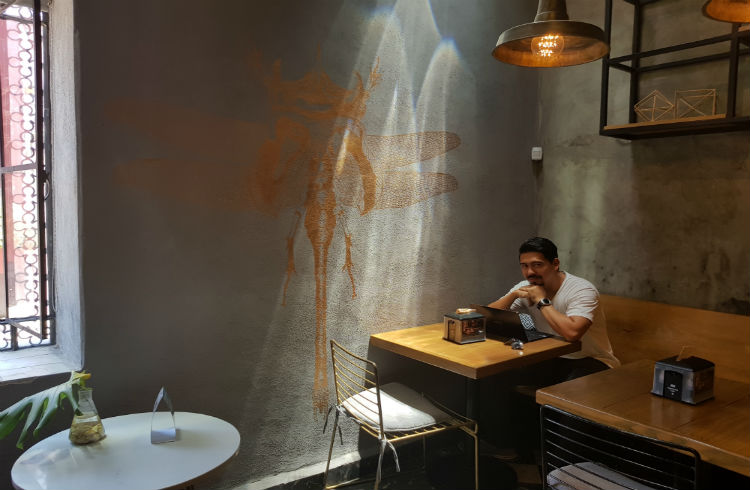 Photo © image/Ray Blakney
Photo © image/Ray Blakney
Listen Now
Alongside delivering our fortnightly World Nomads destination podcast we can now share bonus episodes shining the spotlight on amazing people doing amazing things.
In this episode - Ray Blakney who believes language can change your travel experience married his Spanish teacher and now teaches people around the world the love of language.
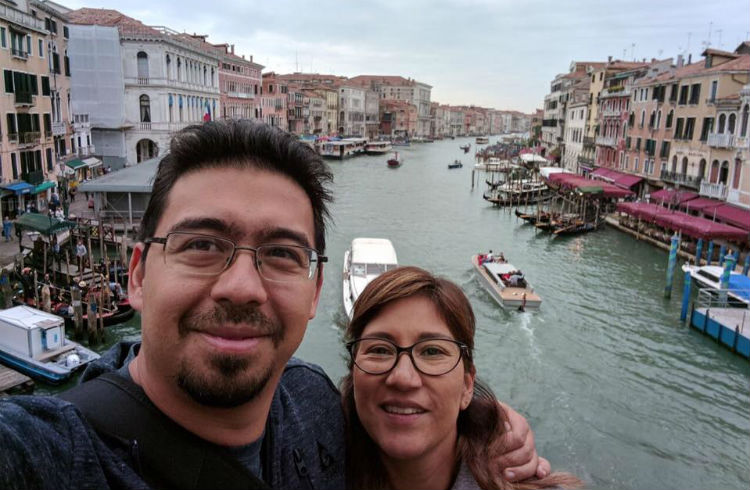
Ray and Laura
What's in the Episode
00:17 World Nomads language guides
00:42 Learning a language to get more out of your travel
00:48 Welcome Ray
01:13 Ray’s story “…I grew up speaking a number of languages and that's kind of how I got into languages myself. I was born in the Philippines, I grew up in Turkey. My father is from the United States but grew up in Africa. And now I live in Mexico cause my wife is Mexican.”
02:06 How Live Lingua came about
04:04 Obstacles to learning a language “…We're really self-conscious.”
05:45 Lost in translation
08:12 Hiring language teachers
10:20 Giving back
13:24 Countries Ray has traveled
15:55 Making a living online
17:03 The virtual office “…we don't have to waste money on a big, shiny office which means our students don't have to pay for our big, shiny office.”
Who's On the Show
Ray Blakney is the CEO and founder of Live Lingua, an accredited and award-winning online language school.
Ray started his professional career as a professional computer geek writing software for a range of companies including Silicon Valley startups, Fortune 500 companies, the U.S. Government and NGO's. In 2006 he decided he wanted a career change and volunteered in the U.S. Peace Corps who sent him to Mexico to work in the heavily indigenous area of Chiapas, Mexico. After completing his 2 years of service he married his Spanish teacher, Laura and stayed in Mexico to start a chain of successful brick and mortar language schools.
Live Lingua currently offers language instruction in, English, Spanish, French, German, Italian, Portuguese, Russian, Arabic, Korean, Japanese, Mandarin Chinese.
If you know of an amazing nomad we should be talking to, then please email us at podcast@worldnomads.com
Resources & Links
Learn a language with Live Lingua
World Nomads also has some handy language guides where you can learn phrases such as "Those drugs are not mine!"
Teacher Indie is Ray’s blog with articles to help teachers understand the business and guide them to earning a side income or start a business online.
The article on Aussie slang no-one understands
Scholarships Newsletter: Sign up for scholarships news and see what opportunities are live here.
Want to Talk to us?
We want to hear from you! If you have any travel insurance questions to Ask Phil, want to give us feedback on the episode, or have suggestions for topics you'd like us to cover, email us at podcast@worldnomads.com
Sign up for Podcast News
Explore your boundaries and discover your next adventure with The World Nomads Podcast. Hosted by Podcast Producer Kim Napier and World Nomads Phil Sylvester, each episode will take you around the world with insights into destinations from travelers and experts. They’ll share the latest in travel news, answer your travel questions and fill you in on what World Nomads is up to, including the latest scholarships and guides. The World Nomads Podcast is not your usual travel Podcast. It’s everything for the adventurous, independent traveler. Don’t miss out. Subscribe today.
Speaker 1: The World Nomads podcast bonus episode. Hear amazing nomads sharing their knowledge, stories, and experience of world travel.
Phil: One of the central pillars of World Nomads, the six things we believe make travel an essential part of life is connecting with locals. Now that's a lot easier to do if you speak the local language and we do have some language phrase books online of our own. They're not comprehensive language guides but they will get you around a destination and maybe get you out of a sticky situation like one of the phrases we translate is "those drugs are not mine".
Kim: Is that the case?
Phil: But you know joking aside, learning a language is a great way to get more out of travel which is why I wanted to talk to this guest. Ray Blakney is the founder of Live Lingua, an online language school. Ray, welcome.
Ray Blakney: Hi Phil. Thanks for having me.
Phil: That's fantastic mate, don't worry. I do want to talk about the online school in a moment, but I know there's an amazing story about how it came about. And I know you've told it a million times, but come on share it with us. It's a great story.
Ray Blakney: I'll start with the full backstory. A little of the story about myself because I grew up speaking a number of languages and that's kind of how I got into languages myself. I was born in the Philippines, I grew up in Turkey. My father is from the United States but grew in Africa. And now I live in Mexico cause my wife is Mexican.
Phil: I told you ... Kim, I told you he's an amazing nomad.
Kim: Yeah, exactly ... exactly.
Ray Blakney: So that's how I actually got my feet wet with the languages. But the real way I got into the business of the languages have I joined an organization called the U.S. Peace Corps, and for the people not familiar with it, it's a volunteer organization based out of the United States and they sent me to Mexico to work with indigenous communities in Southern Mexico. That's when I met my wife, who is actually the language teacher out of us. My background is I'm a computer engineer.
After finishing my two years there, we decided to get married and since we were young, had no kids and no debt, we decided to launch our own language school, kind of a traditional brick and mortar language school. So we opened one up in Mexico, and three months into it, swine flu hit Mexico.
Phil: Right.
Ray Blakney: I don't know how many people remember that -
Phil: Yup.
Ray Blakney: But for a while, they were thinking of quarantining off the whole country and nobody was gonna come, so we had to plan. At that time, my wife had the idea why don't we offer classes via Skype because our teachers worked on hourly rates and without students, they couldn't make an income. So I thought, what the heck? I launched a website, did online marketing, made it number one and within six months, that online website had more students than our brick and mortar school did.
Swine flu ended in a month, everybody started coming back to Mexico, but within six months we were still bigger online than we were at our brick and mortar school. This continued for a few years, we decided then to sell our brick and mortar school, which at the time had expanded into three different locations, and focus exclusively on online language education. We expanded over to 11 languages and rebranded in 2012 as Live Lingua. Before we had 11 small, mini-websites. So that's essentially how Live Lingua came to be, thanks to swine flu.
Kim: In Australia, there are very few of us that speak multiple languages. You cover one at school, but by year 10, you probably are over it. And I've always been told and I've wished I'd continued with my French, that it's too hard as an older person to learn a language. You're better off under six years of age being bilingual. Would you agree with that?
Ray Blakney: It's different when you're learning the language when you're older, but I definitely don't agree that somebody can't learn a language when they're older. Right now I'm studying Japanese and I'm almost forty, so not too old but kind of in the middle of the range. We have students as old as ninety-two studying with us right now at Live Lingua and they are making progress on their languages.
What really changes when you learn languages as opposed to a child is kind of the techniques you need. But I also believe that when a child learns a language it's a little bit of a misnomer because a child doesn't really learn a language in a month, 3 months, 6 months. They do learn it over the course of years, they just don't mind when they make mistakes. I think that's kind of the biggest obstacle we have when we're adults. We're really self-conscious while a child will go out there and make a fool of themselves for day after day in order to learn the language. If an adult has that mindset, they can learn a language at any age.
Phil: And we believe there's a connection between language, and travel and making that connection with the people, and you obviously believe that too.
Ray Blakney: A hundred percent. In fact, when we say we teach language at Live Lingua, what we actually offer as a product, we like to say is understanding. And that understanding is not only on the language level, but it's also on the cultural level. Because in order to really speak a language, you also need to understand the culture. You might know the words, but you won't understand the culture unless you really absorb it.
The example I always give is different senses of humor. For example, Australian humor versus U.S. humor versus humor from the United Kingdom. We all speak the same language, but if I watch a comedy on BBC for example, I might not necessarily laugh while a friend in the U.K. could watch an episode Friends and they wouldn't laugh because the culture is different.
Phil: Yeah.
Kim: Although they do have soundtracks that -
Phil: Yeah a laugh track just to let you know when to laugh. Yeah.
Kim: Yeah exactly.
Phil: That is one of the problems ... I mean, cause we talk about, translating the World Nomads site into different languages as well. And cause I'm the editor of the travel safety article as well. And its ... there's quite a lot of jokes in there as well and that's still gotta be funny in Spanish, you know? And it might actually be offensive or we might just seem like complete idiots. So that's really hard, isn't it, to get everybody understanding?
Ray Blakney: It is, it is. What I remember back when I ran the brick and mortar language school I was the only foreigner there so all of the other staff was Mexican. And I would make jokes that I thought were hilarious and nobody else in the room would laugh. I tried a joke about the birthday suit ... you know, coming to work in your birthday suit so I translated it literally to traje de cumpleanos.
Phil: Yeah
Ray Blakney: Nobody got it. Absolutely nobody in the room. That doesn't mean anything in Spanish apparently, so I kind of looked like a fool later that day in the office.
Kim: Well ... actually it's interesting we're on this topic I'd downloaded to tuck behind our roof the podcast on Australia people trying and failing to guess the meaning of Australian slang, and they go through of few of our ... the things that we say, like 'she'll be right' and then they will ask ... well, let's ask you, Ray. What do you think 'she'll be right' means?
Ray Blakney: I'm gonna take a wild guess that 'she'll be alright', but I honestly don't know.
Kim: Yeah, exactly. Well, the U.K.'s guess is 'the wife is always correct'.
Ray Blakney: Well that's probably accurate as well.
Phil: So that's true.
Kim: Russia's guess is, 'she'll be back in a minute' and the actual meaning is, you're correct, everything will be fine.
Phil: Yeah, and it applies not just to ... you know a female person that decides, you know everything will be okay in the end is basically what it means.
Kim: Yeah. Yeah.
Phil: She'll be right, mate.
Ray Blakney: I totally ... one of my good friends was Australian and he used the word arvo with me once. Like it was part of the conversation and I just smiled and nodded I thought it was slang. I mean I thought it was a regular word, but he assumed everybody understood him. Nobody understood him until he had to explain to us what that word meant.
Phil: Yeah.
Kim: Do you understand, 'chucking a uey'?
Ray Blakney: No absolutely not. Throwing a boomerang -
Phil: Nothing to do with sheep. Absolutely nothing to do with sheep.
Kim: Have a guess, Ray.
Ray Blakney: Taking a U-turn on the road.
Phil: Correct. Yay!
Kim: See? He knows too much, this is the issue.
Ray Blakney: I guess.
Kim: Germany's guess was -
Ray Blakney: I translate into many languages. So yeah.
Kim: Something that is disgusting. Poland's guess was to drink fast, and Russia's guess was everything is cool. But yeah, it's to make a U-turn while you're driving.
Phil: Yeah, make a U-turn.
Kim: That's cause ... that sees -
Ray Blakney: Well that actually tells you a lot about those cultures that are making those guesses as well too, right? Kind of the subliminal side of the culture.
Phil: Yeah. Look I know ... you ... okay, obviously you believe in the power of language, but you do that so much that you've got another project as well. Where you're trying to help people from poorer countries as well because language breaks down barriers.
Ray Blakney: Exactly. We have two ways that we're trying ... three ways actually, that we're trying to do that now. We're expanding into a third way as we speak. The first one is ... we ... for the teachers, we actually try to hire teachers in ... especially for languages like Spanish, Portuguese and Brazilian. In the case of Brazilian, from countries with a lower income and pay them a salary much higher than what they would make if they worked in their own country. So our Spanish teachers make much more per hour than they would make working in a brick and mortar school in Mexico. And we know that because we used to own a brick and mortar school. The same thing for Portuguese. So that's one of the programs we have.
The second program is ... through my time at the Peace Corps, I actually had access to some free language material, but it wasn't organized very well, so once I was done I made some contacts at the Peace Corps offices in D.C., also the U.S. State Department and I was able to get ahold of a number of public domain language courses and we make that freely available on our website. I believe we have close to 150 languages, ranging from survival key Swahili to [inaudible 00:08:57] Batanes, which is a random island in the Philippines and is a dialect I think spoken by like 10,000 people. Two English, and Spanish and Dutch. We have free material, audios, in some cases even videos that people can come into our website and learn a language. If they can't afford it with a teacher, we'll at least help get them started.
And the third we're doing which I believe is similar to a program you guys do at World Nomads is we're starting to work with Save the Children. I just started meeting with them earlier this month and part of the income we get from our classes are gonna be going towards refugees and to sponsor individual children around the world, which is for their education as well.
Phil: Yeah, that's kind of how we got connected as well. I know -
Ray Blakney: Exactly.
Phil: Yeah, that's how ... Footprints Network where we collect micro-donations at the point of sale so you can put, 2 bucks, 5 bucks, 10 bucks depending on how big your insurance policy is.
Kim: Does everyone know what a buck is?
Phil: Sorry, a dollar.
Kim: Yes, good.
Phil: And that goes towards a range of community-based projects that we've identified through NGOs, so you can actually say, yup I'm spending my five dollars towards helping provide solar lanterns for a village in Peru so the kids can study after it gets dark ... things like that. Obviously giving back ... that's our way of giving back. That's really ... that's a really essential part of travel as well, isn't it?
Ray Blakney: I agree, in fact, volunteer travel is something that I personally enjoy to do and I think all of the staff at Live Lingua also enjoys doing. We kinda try to look for the kind of people who fit into our culture. My wife and I volunteer every year at a school for the deaf in Mexico and whenever we travel to a new country, we try to do at a week volunteering there. It's a great way to learn the culture, it's a great way ... even pick up some of the languages if you can't afford to take a language course, go and volunteer somewhere with the locals. You can't help but pick up some of the languages when you're working with people who won't speak any English or whatever your native language is.
Kim: If you can't afford to learn a language, or don't have time to learn a language, how essential is it just to come up with just a few key phrases to use when you're in a country?
Ray Blakney: I think it's critical. When you're going to a new country, even if you make a fool of yourself using those key phrases, it actually ... the people you're talking to warm up when you try to use the local language. Even if you use it badly, it opens a lot of doors for you. Another story from when I first came to Mexico as a Peace Corps volunteer I didn't speak a word of Spanish and I kept on telling people I was embarazado because I thought that meant embarrassed. Apparently, it means I was pregnant. So I liked to tell people I was pregnant for three months in Mexico when I arrived.
Kim: Congratulations.
Ray Blakney: But people ... exactly -
Phil: That's a great icebreaker. Yeah, that's -
Ray Blakney: It is, it is. And I thought people were laughing because I was being humble. No, they were actually laughing at me and not with me. But, it opened up doors and people kind of warmed up to me right there when I was there. So don't be afraid to kind of try the language, you'll be surprised at the reception you get from the locals. Nobody will make fun of you for trying to speak their language.
Phil: Yeah.
Kim: Now, you mentioned the Peace Corps. Our U.S. listeners will be familiar with that, but for listeners in other parts of the world explain what it is.
Phil: Yeah. Did you actually -
Ray Blakney: Sure, it was -
Phil: Have to put a uniform on? Is it sort of militarized in some way? Or -
Ray Blakney: That's actually a ... surprisingly even some of my friends in the United States thought I was joining a branch of the Army. When I joined the Peace Corps ... my history in Peace Corps ... I was actually born into the Peace Corps. My father was a Peace Corps volunteer in the Philippines, and I was born while he was still serving, so I like to say, you know, from 0 to 11 months old I was in the Peace Corps, and then I joined it again in my mid to late twenties.
The Peace Corps is a program started by John F. Kennedy, so back in the seventies I believe, and essentially what it does is it takes volunteers from the United States and send them to generally third world countries, now sometimes developing countries with almost no pay outside of essentials to help a local community in the country you get sent to. And the way they help varies depending on the skill set of the person they send. If you volunteer straight out of college, some of the common things that they send people over for is HIV education. They go through a three-month course and then they go out and try train people with HIV or English education, that's a very easy one to get people ... especially for people with no English level, to do ... to learn a little bit of English.
In my case, I was actually sent over as a systems engineer. There weren't that many systems engineers applying for the Peace Corps, so they took me and then they sent me to Mexico. I was actually working at a science center in Southern Mexico. Kind of the U.S. equivalent of the National Science Foundation, and I was helping the science center assist the indigenous communities in Chiapas in particular, in Southern Mexico.
Phil: So how many ... you say you a lot of travel with your wife. So where have ... how many countries have you been to and what's your favorite?
Ray Blakney: I've never actually sat down and counted, but I would say going on 40.
Phil: Wow.
Ray Blakney: And hopefully, Japan. We'll be there in the next four weeks and India will be in October. So we'll check two more off the list. Let's see what would be my favorite? We loved Italy. Italy was an amazing trip. I got a chance to travel around my sister, and her boyfriend and my wife. We were there I think it was last year, maybe the year before. We really liked Italy, and we really enjoyed our time in Morocco. I think those might be our two favorite countries that we've traveled to so far. And I love ... personally, I have a connection but it's to Turkey as well, Istanbul, but that's because I lived there for fifteen years and I grew up there. So I don't know if that counts as travel per se.
Phil: What was it about Morocco that you liked so much?
Ray Blakney: For me, it actually reminded me a little bit of Turkey when I went there. I couldn't speak the language, of course, French or the Arabic that they speak or any of the local languages spoken by people there. But it seemed like such a mix of a culture, you could go into a part of Morocco and Spain is essentially ... Spanish is the native language. Another part French is, another part of English is and then you go to Marrakech and everybody speaks ... me speaking three or four languages, I felt like the least educated person there. The guy serving me kabobs in the market spoke like twelve. So, it was just a fascinating mix of cultures from the Sub Saharan Africa, from the Middle East, from the Spanish, from the French ... all mixed together in a relatively small country.
Kim: Now you also help apart from doing all of this. You help people become digital nomads.
Ray Blakney: That's right, that's right. I'm involved in some communities that focus on that, and I have a blog that I have called Teacher Indie where I'm actually specifically trying to help teachers become digital nomads. My life has kind of lead me in that direction where I've been working in the education field, but my expertise or my knowledge is not education. It's business and IT, so I'm trying to kind of combine my skills with the teaching skills, and help teach people to make a living online, whether it be via teaching directly, blog, creating courses and a lot of the other tricks that are related to online business.
Kim: I've just looked up that site, looks great. We'll share that in share notes field.
Phil: And so ... your business itself ... you're a digital nomad too. And so it's the whole business we were talking actually before we hit the record button. Just tell us about that.
Ray Blakney: Sure. Live Lingua is actually 100% digital business which is becoming much more common these days, but we don't have a physical address per se, we're registered in Boston in the United States, that's where we pay our taxes. But, we don't have to waste money on a big, shiny office which means our students don't have to pay for our big, shiny office either.
All of our staff work around the world. My wife and I spend most of the year in Mexico. I was mentioning my content manager is in Denver now, but he worked for a few months in Bali with us. Last year, our head coordinator, which is the one who handles the assignment of teachers and students, he started working for us in Mexico, but he's now back in the United Kingdom. Our HR manager's in Spain, we have a programmer in Ukraine and another one in the United States. And we meet every week via Skype meetings and we have a team meeting every month and we have a group meeting every year in person. So we meet up in a different part of the world and we kinda try to connect that way. And it's been working well as long as you're kind of used to this culture, or open to this kind of culture, I think it works very well.
Kim: Well you've got a lot going on as we say here in Australia you're flat out like a loser drinking.
Phil: Yeah, good luck with Australian idioms. Seriously.
Ray Blakney: Australia's on my list of countries to visit. I might have to take some Australian lessons, you know before I go down there. We have some Australian teachers, I might take some English lesson with them before I come.
Kim: Oh, absolutely. You might need to. Well, been quite inspiring listening to you and as Phil said you're indeed an amazing nomad.
Ray Blakney: Thank you very much.
Kim: I enjoyed that chat, yeah. Conversation, whatever you refer to as it is -
Phil: You're a living thesaurus, Kim, what can I say? Hey, you can find our Amazing Nomad bonus episodes alongside the Amazing Nomads Destination podcast on iTunes. If you know an Amazing Nomad we should highlight, send us an email at podcast@worldnomads.com.
Speaker 1: Amazing Nomads. Be inspired.
Related articles
Simple and flexible travel insurance
You can buy at home or while traveling, and claim online from anywhere in the world. With 150+ adventure activities covered and 24/7 emergency assistance.
Get a quote



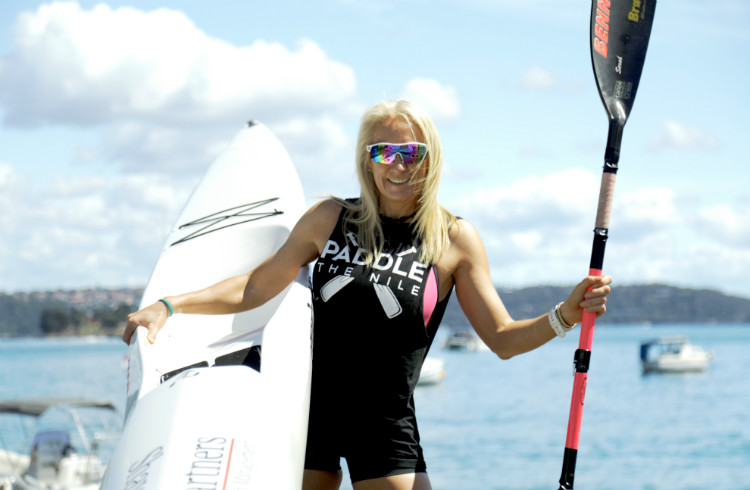
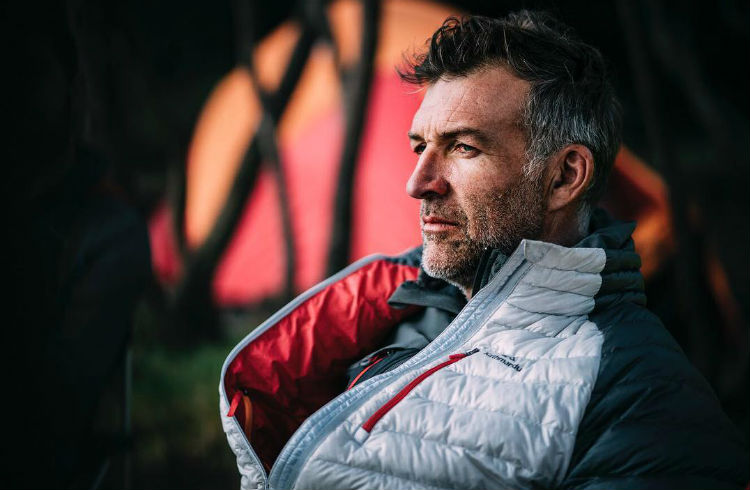
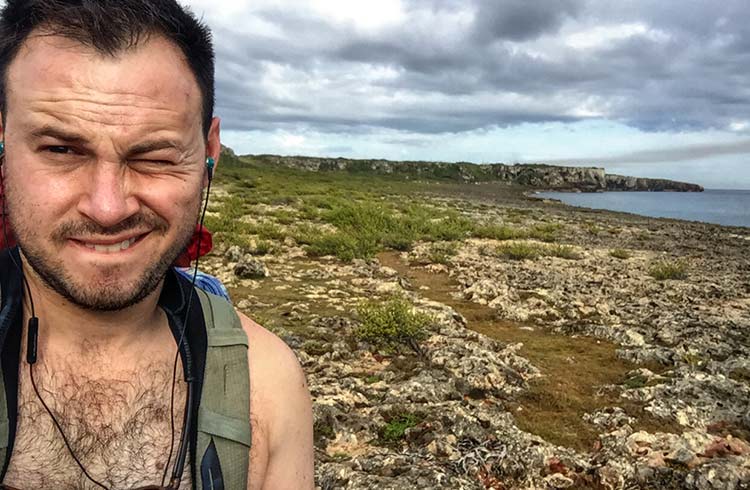
No Comments